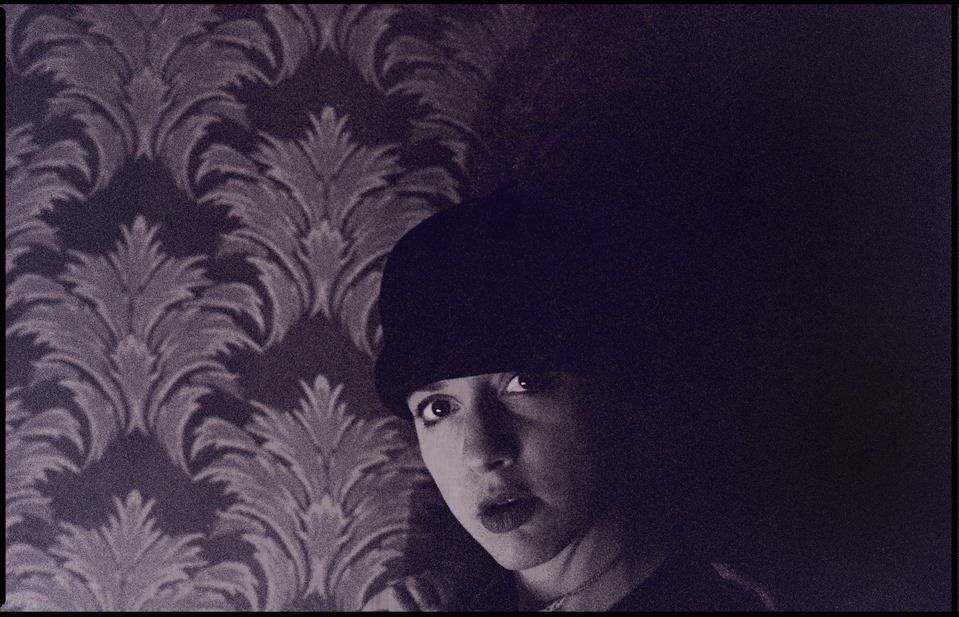_______________________________________________________________
Kathy Acker, born 18. April 1947 in New York City, was a conceptual experimental writer and counter-cultural icon, whose works can also be described as highly political, queer feminist and intersectional in conception. Self-publishing her chap books in San Francisco between 1973 and 1974 via mail-art, while selling them at bookshops, such as Sand Dollar in Berkeley, Acker created a reputation for herself as The Black Tarantula through her gender fluid writing. She hosted two radio shows with Peter Gordon, one at KPOO in 1973, one at KPFA from 1974- 1975. After publishing The Childlike Life of the Black Tarantula at the The Vanishing Rotating Triangle Press, her reputation excelled through an article in the Berkeley Barb, which stated: “Kathy’s characters are extremely fluid, sometimes even changing sex in mid-sentence, giving rise to the kind of dynamic confusion Burrough’s generates.” (Means 13)
Returning to New York in 1975, Acker is affiliated with the Punk Scene that emerged from the CBGB’s and the Max’s Kansas. In 1976 Acker received a CAPS grant, which allowed her to visit Haiti allowing her to write her book Kathy Goes to Haiti (Kraus 141). In 1979/1980 Acker moved to Seattle for approximately a year. Returning to New York in 1980/81, she was part of what is known as the East Village Scene. In 1981 she won the Pushcart Press prize for her short story “New York in 1979.” (Kraus 170; Martin 39). She became increasingly known for her collaborations with Robert Mapplethorpe, Richard Prince, Bette Gordon, Michael Leatherdale, and others. Joining with Grove Press during this time, she gained critical acclaim in 1984 for the publication of Blood and Guts in High School. The novel, which largely dealt with topics such as abortion and pregnancy, commented on the politics following Roe v. Wade in 1973, resonated with the political climate of 80s, in which terrorist attacks on abortion clinics became fashionable.
Becoming a literary star in the English literary press, Acker moved to England at 1985, where she wrote Don Quixote and Empire of the Senseless. Well known, for her pastiche works, during this time, Acker also continued her practice of copying and rewriting text, re-appropriating content and language to give speech to queer and feminist concerns. In 1989, Pandora republished Acker’s Kathy Goes to Haiti, The Adult Life of Toulouse Lautrec, and “Florida” as a book named Young Lust. During this year she was an outspoken defender of Robert Mapplethorpe and Salman Rushdie’s work. In May1989, of the same year, Acker held two workshops in Seattle, from which she would choose one student to open her reading on May 26th and 27th, which kicked off the performance series CoCACabana at the Center On Contemporary Arts in Seattle. During this time, Acker inspired Kathleen Hanna, who participated in the workshops and was chosen to open for her at the CoCA, to become a performer, eventually leading Hanna to start what today is known as the Riot Grrrl movement.
The publication of Young Lust, however, received a backlash in July and August 1989, when Acker was accused of plagiarizing Harold Robbins’s The Pirate. Acker, who had always openly talked about copying and using the materials of other writings, was shunned by the English literary society. In 1990 she published In Memoriam to Identity and moved from New York to San Francisco, where she taught as an adjunct Professor at the San Francisco Art Institute. During this time, writing through the body became a new focus of her work, while writing My Mother: Demonology, published 1993. During this time she experimented with what she would call “languages of the body” in her 1995 essay “Seeing Gender” (167), utilizing dreams as one kind of language to be used for writing, while also being interested in taking language to its limit through body building and sexual climax. The (female) body therein not only became object and topic of her writing, but the subject through which she wrote her texts, such as her last novel, Pussy, King of the Pirates, which proved one of her most cutting edge experimentations. She recorded and performed a musical version of the novel with The Mekons.
After briefly moving back to England in 1996 and back again, Acker was diagnosed with breast cancer. After her mastectomy, the doctor’s found that her cancer had already spread to the nymph system. Having distrust in the medical system of the US and no health insurance, Acker looked for alternative treatments of cancer, some of which were fraudulent. Entering a clinic for alternative cancer treatments in November 1997, she died in Tijuana, December 1st at 1 AM in 1997. Posthumously, Redoing Childhood, a recording of an excerpt from My Mother: Demonology with music provided by Tribe8, was published in 1999 by Killrockstars. Voicing queer feminist concerns through a direct and visceral, yet playful and intellectually charged language, Acker’s work has remained controversial, as it not only erases the discrepancy between high and low literature, but frontally challenges patriarchy as a “truth”, while giving voice to queer feminist concerns.
Bibliography
Acker, Kathy, “Seeing Gender” in: Bodies of Work. Essays by Kathy Acker. Serpent’s Tale, London, p. 158-168.
Kraus, Chris, 2017, After Kathy Acker. Allen Lane, London.
Martin, Douglas A., 2017, Acker. Nightboat, New York.

